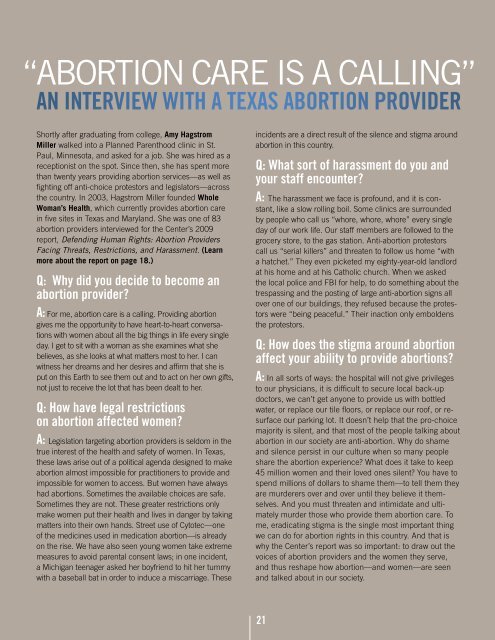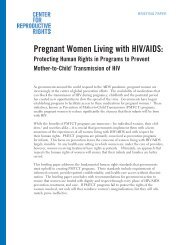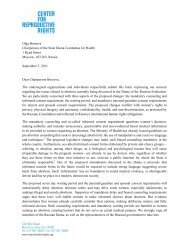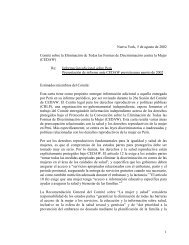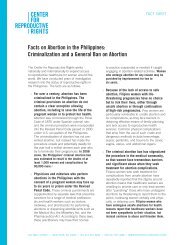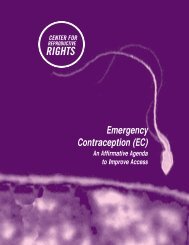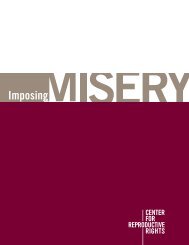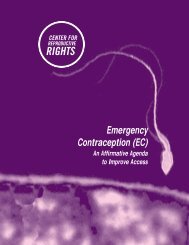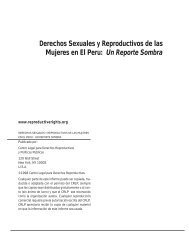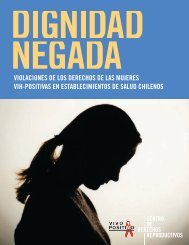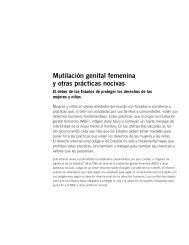CRR Annual Report 2009 - Center for Reproductive Rights
CRR Annual Report 2009 - Center for Reproductive Rights
CRR Annual Report 2009 - Center for Reproductive Rights
You also want an ePaper? Increase the reach of your titles
YUMPU automatically turns print PDFs into web optimized ePapers that Google loves.
“Abortion Care Is a Calling”<br />
An Interview with a Texas Abortion Provider<br />
Shortly after graduating from college, Amy Hagstrom<br />
Miller walked into a Planned Parenthood clinic in St.<br />
Paul, Minnesota, and asked <strong>for</strong> a job. She was hired as a<br />
receptionist on the spot. Since then, she has spent more<br />
than twenty years providing abortion services—as well as<br />
fighting off anti-choice protestors and legislators—across<br />
the country. In 2003, Hagstrom Miller founded Whole<br />
Woman’s Health, which currently provides abortion care<br />
in five sites in Texas and Maryland. She was one of 83<br />
abortion providers interviewed <strong>for</strong> the <strong>Center</strong>’s <strong>2009</strong><br />
report, Defending Human <strong>Rights</strong>: Abortion Providers<br />
Facing Threats, Restrictions, and Harassment. (Learn<br />
more about the report on page 18.)<br />
Q: Why did you decide to become an<br />
abortion provider<br />
A: For me, abortion care is a calling. Providing abortion<br />
gives me the opportunity to have heart-to-heart conversations<br />
with women about all the big things in life every single<br />
day. I get to sit with a woman as she examines what she<br />
believes, as she looks at what matters most to her. I can<br />
witness her dreams and her desires and affirm that she is<br />
put on this Earth to see them out and to act on her own gifts,<br />
not just to receive the lot that has been dealt to her.<br />
Q: How have legal restrictions<br />
on abortion affected women<br />
A: Legislation targeting abortion providers is seldom in the<br />
true interest of the health and safety of women. In Texas,<br />
these laws arise out of a political agenda designed to make<br />
abortion almost impossible <strong>for</strong> practitioners to provide and<br />
impossible <strong>for</strong> women to access. But women have always<br />
had abortions. Sometimes the available choices are safe.<br />
Sometimes they are not. These greater restrictions only<br />
make women put their health and lives in danger by taking<br />
matters into their own hands. Street use of Cytotec—one<br />
of the medicines used in medication abortion—is already<br />
on the rise. We have also seen young women take extreme<br />
measures to avoid parental consent laws; in one incident,<br />
a Michigan teenager asked her boyfriend to hit her tummy<br />
with a baseball bat in order to induce a miscarriage. These<br />
incidents are a direct result of the silence and stigma around<br />
abortion in this country.<br />
Q: What sort of harassment do you and<br />
your staff encounter<br />
A: The harassment we face is profound, and it is constant,<br />
like a slow rolling boil. Some clinics are surrounded<br />
by people who call us “whore, whore, whore” every single<br />
day of our work life. Our staff members are followed to the<br />
grocery store, to the gas station. Anti-abortion protestors<br />
call us “serial killers” and threaten to follow us home “with<br />
a hatchet.” They even picketed my eighty-year-old landlord<br />
at his home and at his Catholic church. When we asked<br />
the local police and FBI <strong>for</strong> help, to do something about the<br />
trespassing and the posting of large anti-abortion signs all<br />
over one of our buildings, they refused because the protestors<br />
were “being peaceful.” Their inaction only emboldens<br />
the protestors.<br />
Q: How does the stigma around abortion<br />
affect your ability to provide abortions<br />
A: In all sorts of ways: the hospital will not give privileges<br />
to our physicians, it is difficult to secure local back-up<br />
doctors, we can’t get anyone to provide us with bottled<br />
water, or replace our tile floors, or replace our roof, or resurface<br />
our parking lot. It doesn’t help that the pro-choice<br />
majority is silent, and that most of the people talking about<br />
abortion in our society are anti-abortion. Why do shame<br />
and silence persist in our culture when so many people<br />
share the abortion experience What does it take to keep<br />
45 million women and their loved ones silent You have to<br />
spend millions of dollars to shame them—to tell them they<br />
are murderers over and over until they believe it themselves.<br />
And you must threaten and intimidate and ultimately<br />
murder those who provide them abortion care. To<br />
me, eradicating stigma is the single most important thing<br />
we can do <strong>for</strong> abortion rights in this country. And that is<br />
why the <strong>Center</strong>’s report was so important: to draw out the<br />
voices of abortion providers and the women they serve,<br />
and thus reshape how abortion—and women—are seen<br />
and talked about in our society.<br />
21


